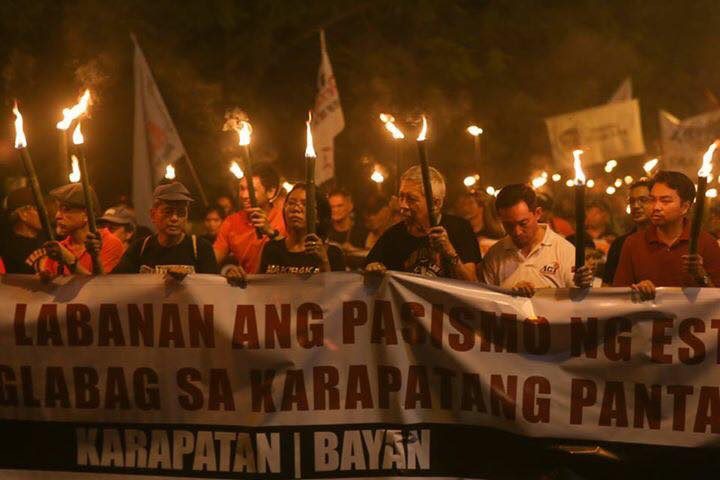SUMMARY
This is AI generated summarization, which may have errors. For context, always refer to the full article.

Recent Human Rights Watch (HRW) reports condemning the Duterte administration’s war on drugs have been widely covered in both the Philippine and international media. Sadly, one leading member of HRW has also used his prominent position to make baseless criticisms of one of the Philippines’ leading human rights group, Karapatan. (WATCH: Rappler Talk: Human Rights Watch on extrajudicial killings)
During a recent conference at Harvard University, the Deputy Director of HRW, Phelim Kine, condemned Karapatan for failing to criticize President Rodrigo Duterte and his war on drugs. Kine suggested Karaptan was soft on Duterte because he identified himself “as a leftist.” (READ: HRW on war on drugs: PH needs ‘international intervention’)
He further stated: “We have had a complete abrogation of betrayal of the civil society role in this…I think there really needs to be a radical self-examination by these self-proclaimed watchdogs of the public good as to how they fail 7,000 plus people because they decided these people are not worth protecting.”
Later when I asked Kine for clarification of his views on Twitter, he claimed: “They (Karapatan) have failed miserably to speak out…forcefully against the slaughter of urban slum dwellers in Duterte’s “drug war.”
Kine’s views on Karapatan are unfounded. The organization has spoken out strongly against the wave of extrajudicial killings of drug suspects in urban areas from the very start of the Duterte administration. (IN NUMBERS: The Philippines’ ‘war on drugs’)
In the weeks leading up to Duterte’s inauguration on June 30, 2016, Karapatan released a statement showing their position on various policies of the new President. They supported his initial moves to renew peace talks with the National Democratic Front of the Philippines (NDFP) and appoint some progressives to his Cabinet, but strongly condemned extrajudicial killings of criminal suspects, possible reinstatement of the death penalty, and the burial of Ferdinand Marcos at the Libingan ng mga Bayani heroes’ cemetery.
In August 2016, Karapatan submitted a position paper to the public hearing of the Senate committee on justice and human rights stating that “the President should prosecute and hold accountable the perpetrators of the extrajudicial killings, including those from the police.”
More recently, the group has spoken out against the joint Philippine National Police (PNP), Armed Forces of Philippines (AFP), and Philippine Drug Enforcement Agency raid at Cebu Provincial Detention and Rehabilitation Centre.
According to Karapatan, stripping all the prisoners naked and lining them up breached the Anti-Torture Act and international instruments on torture and degrading punishment. They have also spoken out against the AFP being granted the right to lead anti-drug operations.
Karapatan’s opposition to the killings extends beyond mere words. Karapatan, together with the leftist activist group Bayan, urban poor activists and progressive church people have started a new multisectoral activist group called Rise Up to actively challenge the drug war as well as assist and organize its victims.
As The Guardian reported, Rise Up has organized churches to give sanctuary to drug addicts at risk of being targeted by extrajudicial killings in return for them taking steps to turn their lives around.
This initiative of Karapatan and the wider Philippine progressive movement is literally saving lives. HRW, in contrast, restricts its activities to research and lobbying.

Karapatan has also continued its important work of documenting killings of political activists and other civilians by paramilitary groups and state forces, even while most international and local attention has focused on the drug killings.
For the month of February 2017, the organization documented 14 killings of civilian political activists following the Philippine government’s withdrawal from peace talks and the declaration of an all out war on the New Peoples Army (NPA) by Defense Secretary Delfin Lorenzana.
Previous administration’s counterinsurgency programs against the NPA have not just targeted armed rebels. State forces have killed unarmed union, peasant, and indigenous activists from progressive organizations tagged by the state as communist sympathizers.
Sadly, it appears the Duterte administration’s Oplan Kapayapaan counterinsurgency program is just history repeating itself.
With both the drug killings and the renewed counterinsurgency against the Left, Karapatan, and other Filipino people’s organizations, will be very busy over the coming months and years with difficult work. (READ: Confronting extrajudicial killings under Duterte)
Mr Kine should show more respect to an organization which is actually on the ground in the Philippines working day in and day out with victims of human rights abuses and preventing further abuses from happening.
If he continues making baseless criticisms of one of the Philippines’ foremost human rights organizations, it will be harder for many of us in the international community concerned with human rights and justice to take his analysis seriously.
Cameron Walker recently completed a Law/Arts degree at the University of Auckland in New Zealand. He volunteers with Auckland Philippines Solidarity.
Add a comment
How does this make you feel?
There are no comments yet. Add your comment to start the conversation.